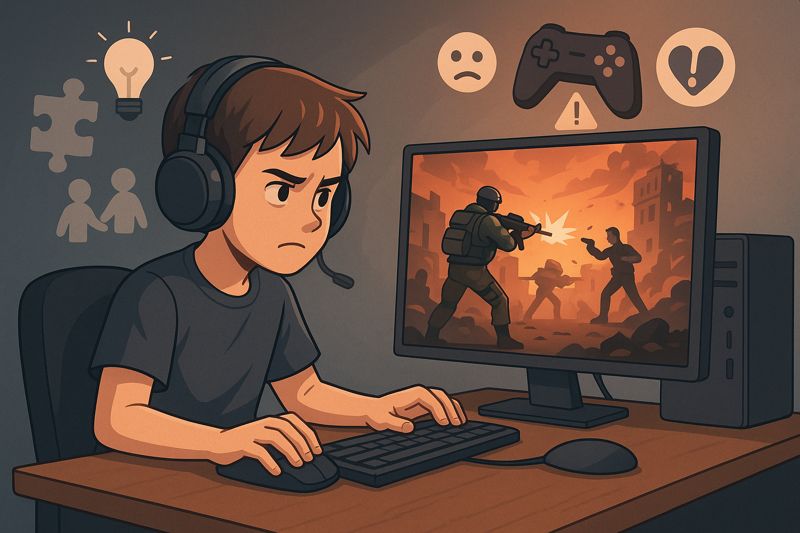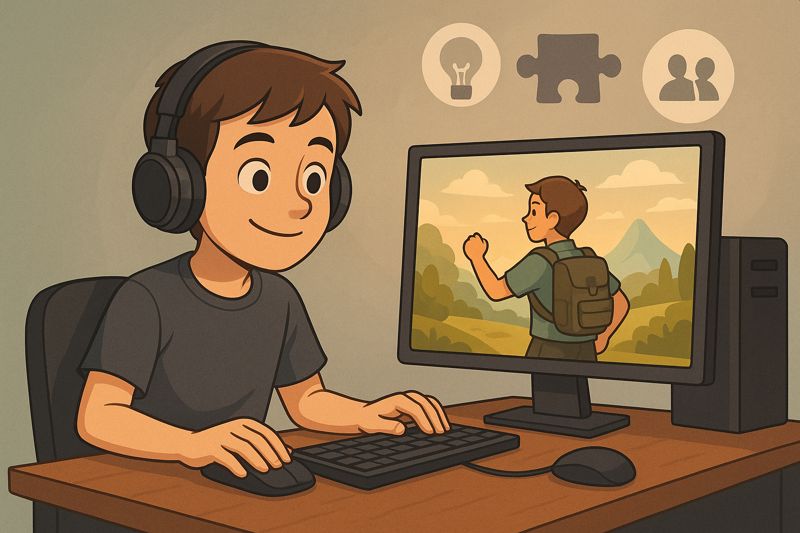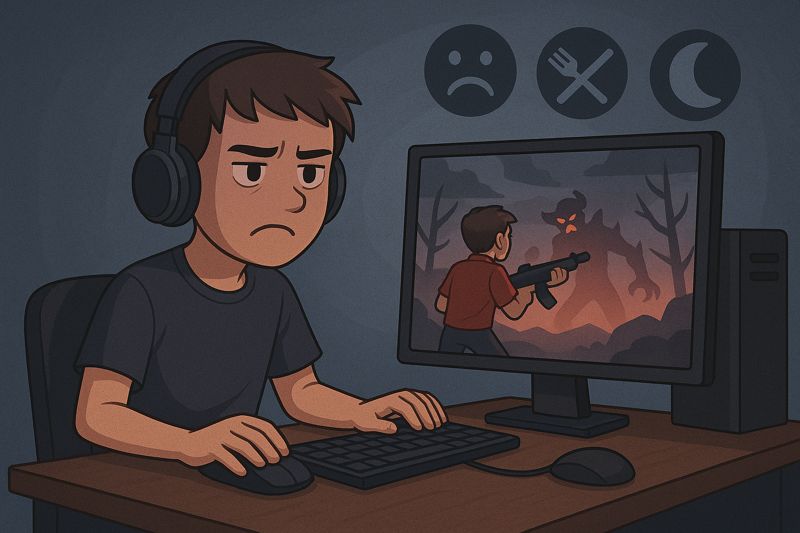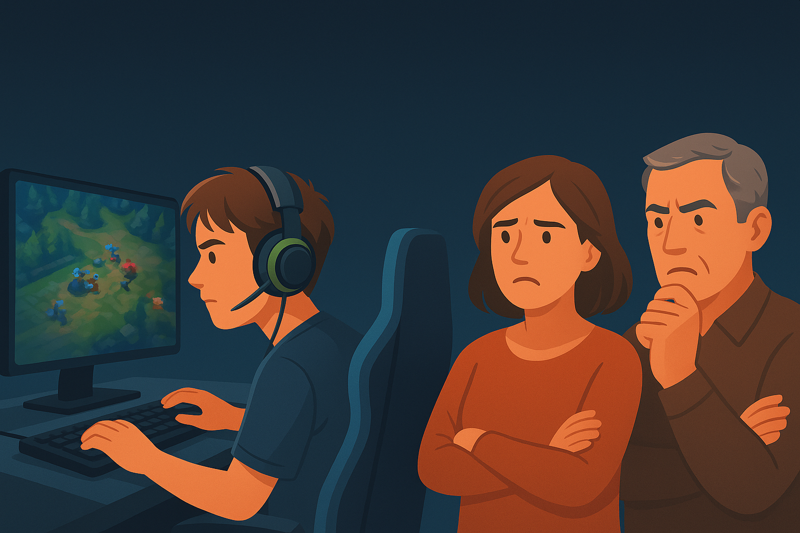
In today’s world, where digital technology has become an integral part of life, computer games occupy one of the leading places among the types of leisure activities for young people. They are available on various platforms, from personal computers to smartphones, and resources such as Online Casino CZK demonstrate how deeply gaming culture has penetrated the online space.
The relevance of the topic is due to the fact that games not only entertain, but also significantly affect the psyche, behaviour and social skills of young people.
The positive impact of computer games

Computer games have not only entertainment value, but also educational potential. When used correctly, they can help develop important skills, support psychological health and even improve education.
Development of cognitive skills
Many modern games require players to think quickly, analyse situations and make decisions in a short period of time. This promotes the development of logic, attention, memory, and strategic thinking. Puzzle or strategy games, where you need to plan ahead, develop the ability to predict the consequences of your actions and think systematically. Games that require quick reactions also help improve hand-eye coordination and overall reaction speed.
Socialisation
Online games create new opportunities for communication and interaction. Young people form teams, achieve goals together and learn to work together. Games such as team shooters or role-playing projects foster a sense of responsibility towards other players and develop leadership qualities and cooperation skills. Through chat rooms and voice services, players meet people from different countries, broadening their cultural view of the world.
Psychological relief
Games often serve as a kind of ‘emotional therapy.’ They allow you to distract yourself from everyday problems and reduce stress and tension. In the virtual world, players can vent their emotions, experience success, and realise their potential in a safe environment. This is especially important for teenagers who are going through an emotionally intense period of personal development.
Educational aspect
There are numerous educational and simulation games that help in learning languages, history, mathematics, programming, or business management. For example, simulators allow players to learn how to make decisions in complex situations, and educational projects make the learning process interesting and motivating. Thus, the game becomes not only entertainment but also an effective tool for learning.
The negative impact of computer games

Despite their many positive aspects, excessive enthusiasm for computer games can have serious negative consequences for the physical, mental and social development of young people. The lack of control by parents or the player themselves is particularly dangerous when the game ceases to be a leisure activity and becomes an addiction.
Gaming addiction
This is one of the most common problems among young people today. Gaming addiction occurs when a person loses control over the time spent in the virtual world and prioritises gaming over education, communication or other important areas of life. The main reasons for this are boredom, lack of self-fulfilment in real life or the desire to escape from problems. The consequences are emotional instability, irritability, sleep problems, and loss of interest in reality.
Health problems
Prolonged sitting at a computer leads to a number of physical disorders. Most often, vision suffers, as constant eye strain causes fatigue and deterioration of visual acuity. Posture problems also arise due to incorrect sitting, which can lead to scoliosis or back pain. A sedentary lifestyle reduces overall physical activity, contributes to weight gain and impairs cardiovascular function.
Social isolation
Excessive immersion in the virtual world often distances young people from real life. They communicate less with family and friends and stop participating in social or cultural events. This results in feelings of loneliness, alienation and, in some cases, even social anxiety, when it is difficult for a person to establish real contacts.
Aggression and violence
Games that contain scenes of cruelty, fighting or murder can affect the emotional sphere of adolescents. Studies show that prolonged exposure to aggressive content can reduce empathy and increase irritability. In some cases, young people begin to imitate aggressive behaviour patterns, perceiving them as the norm.
Loss of time and decline in academic performance
Games are often so addictive that players lose track of time. Young people begin to skip classes and fail to do their homework, which leads to a decline in academic performance. Over time, this leads to an irresponsible attitude towards responsibilities and a decrease in motivation for self-development and achieving goals in real life.
The negative impact of computer games is primarily associated with excess. When gaming exceeds reasonable limits, it can harm both the physical health and mental balance of young people.
Ways to reduce the negative impact

- Limit playing time – Play no more than 1–2 hours a day, alternating games with study, sports and rest. This helps maintain balance and prevents fatigue.
- Choose quality games – Choose educational, logical or educational games. Avoid projects involving violence or aggression, pay attention to age restrictions.
- Use gamification in learning – Use game elements (points, levels, achievements) in the learning process to increase interest and motivation to learn.
- Parental support – Discuss games with children, set rules and encourage real-life activities.
- Shaping digital culture – Teach young people to use technology responsibly and understand the difference between games and reality.
Conclusions
Computer games have become an integral part of modern youth life — they entertain, develop and allow you to immerse yourself in new worlds. However, like any hobby, games have two sides: they can be both beneficial and harmful. On the one hand, they help develop attention, logical thinking, reaction speed and the ability to work in a team. On the other hand, excessive immersion in virtual worlds can lead to addiction, social isolation, poor health and reduced academic performance.
That is why it is extremely important for young people to take a responsible approach to their gaming leisure time. It is important to realise that gaming should be a form of relaxation, not a substitute for real life. A responsible approach means being able to manage your time, choose quality content and combine gaming with learning, physical activity and live communication.
